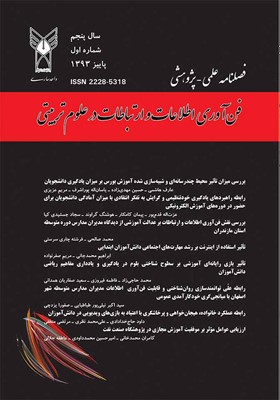ارزیابی عوامل مؤثر بر موفقیت آموزش مجازی در پژوهشگاه صنعت نفت
محورهای موضوعی : فن‎آوری اطلاعات
کامران محمدخانی
1
*
,
امیرحسین محمد داودی
2
![]() ,
عاطفه جلالی
3
,
عاطفه جلالی
3
1 - استادیار گروه مدیریت آموزش عالی، دانشگاه آزاد اسلامی واحد علوم و تحقیقات تهران، تهران، ایران
2 - استادیار گروه مدیریت آموزشی، دانشگاه آزاد اسلامی واحد ساوه، ساوه، ایران
3 - کارشناس ارشد مدیریت آموزشی، دانشگاه آزاد اسلامی واحد علوم و تحقیقات تهران، تهران، ایران
کلید واژه: آموزش مجازی, کیفیت سیستم, کیفیت اطلاعات و محتوا, کیفیت استاد, تمایل کاربر,
چکیده مقاله :
استفاده از آموزش مجازی به خلق، مدیریت و توسعه آموزش به طور اثربخش، سریع و اقتصادی کمک میکند. امروزه موفقیت آموزش مجازی یکی از مهمترین موضوعات در مدیریت آموزشی میباشد. هدف پژوهش حاضر، ارزیابی عوامل مؤثر بر موفقیت آموزش مجازی شامل کیفیت سیستم، کیفیت اطلاعات و محتوا عوامل تسهیلکننده، کیفیت استاد، تعامل بین استاد و دانشجویان و تمایل کاربر است. روش تحقیق، توصیفی از نوع پیمایشی بود. ابزار گردآوری اطلاعات، پرسشنامه محققساخته بود که روایی محتوایی آن توسط متخصصان تأیید و پایایی آن با استفاده از ضریب آلفای کرونباخ 92/0 بهدست آمد. جامعه آماری پژوهش کلیه کارشناسان پژوهشگاه صنعت نفت بود که در سال 1391 دورههای آموزش مجازی را گذارانده باشند که در حدود 250 نفر بودند که از بین آنها، 156 نفر به عنوان نمونه و به روش نمونهگیری تصادفی طبقهای- نسبی انتخاب شدند. برای تجزیه و تحلیل دادهها از آمار توصیفی، شامل میانگین و انحراف استاندارد و برای آزمون فرضیهها از آمار استنباطی، شامل آزمون کولموگروف- اسمیرنوف، آزمونtتک نمونهای و آزمون فریدمن استفاده شده است. نتایج نشان داد که عوامل مؤثر بر موفقیت آموزش مجازی در پژوهشگاه صنعت نفت در شرایط مناسبی هستند و رتبهبندی این عوامل نشان داد که عوامل کیفیت اطلاعات و محتوا، تمایل کاربر و کیفیت سیستم دارای وضعیت مناسبتری نسبت به سایر عوامل هستند.
Using virtual education helps in creating, managing and developing education effectively, rapidly and economically. The success of virtual education today stands among the most significant subjects in the educational administration. The purpose of the present study was to evaluate the factors influencing the success of virtual education including system quality, information and content quality, facilitative factor, teachers' quality, teachers-students interaction and operators' intention. The research method was descriptive and survey. Data gathering instrument was a self-administered questionnaire approved by the experts. The reliability was calculated using Cronbach coefficient with the ratio of 0.92. The statistical population of the study consisted of all experts in the Research Institute of Petroleum industry (RIPI) who had passed the related virtual education in 2012 (N=250). Using stratified random sampling, 156 people were chosen as sample. To analyze the data, descriptive statistics including mean and standard deviation was used. Inferential statistics including Kolmogorov-Smirnov test, one-sample t test and Freidman test were used to verify the hypotheses. Results showed that the factors influencing the success of virtual education in the (RIPI) were evaluated in an appropriate condition. Prioritizing the factors, it was also revealed that information and content qualify, operators' intention and system qualify stood in better conditions comparing the other factors.
e-Learning, pages 19-26, University of Cape Town.

